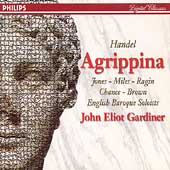This is a first-rate performance of Handel's second Italian
opera, concerning the Roman empress Agrippina's attempts to
secure the throne for her son Nero early in the first century
AD. With Gardiner at the helm, this recording has a slightly
bigger vocal and orchestral sound than comparable Handel sets
from, for example, Robert King or Jean-Claude Malgoire, captured
in a friendly but not overly resonant acoustic. There is no
choir; the few choral numbers, where they occur, are sung by the
soloists.
Della Jones turns in a characterful performance as the emperor's
wife--who was also his niece--alternately charming, conniving
with, and denouncing those she has drawn into her plan, which
include all the principals. There is occasionally a slight
dryness in her tone, but otherwise she is very impressive,
handling the coloratura like a true veteran and acting the part
wonderfully, as in her big Act II aria and recitative "Pensieri,
voi mi tormentate!" As her husband Claudius, bass Alastair Miles
is appropriately bumbling, his cavernous basso profondo adding a
comic note to his technically secure interpretation. The
casting of Derek Lee Ragin, a countertenor with a surprising
upper extension and great agility, in the soprano castrato part
of the adolescent Nero is a bold move yielding mixed results.
As the tessitura is very high for a falsetto male, Ragin sounds
strained in a few places, but his rendition is otherwise solid
and he conveys the spoiled-brat character effectively.
The lovers Poppea and Ottone are the most fully-fleshed
characters dramatically, sung with great style by Donna Brown
and Michael Chance. The latter's Act II accompanied recitative
and aria "Otton!... Voi che udite il mio lamento", occurring
after he has been rejected in turn by Agrippina, Poppea, and
Nerone (via a quick "exit aria" from each), is the most
affecting episode in the opera, and shows how great Handel's
gifts for writing dramatic vocal music were, even at this early
stage in his operatic career. Poppea's challenging music
includes some incredibly long and florid melismas, as in her
final Act I aria "Se giunge un dispetto", all expertly handled
by Brown whose stunning technique never gets in the way of her
characterization.
The secondary roles of the imperial servant Lesbo and the
henchmen Pallante and Narciso (the last two compared to
Tweedledum and Tweedledee in the program notes) are handled
stylishly and characterfully; it's a pity Anne Sofie von Otter's
cameo as the *dea ex machina* Juno isn't on the same level—she
sings her one aria with an almost audible lack of enthusiasm,
and it is left up to Gardiner to provide the final high note
with an energetic reading of the *ballo* that closes the work.

© Mathieu Marcil - 1997

